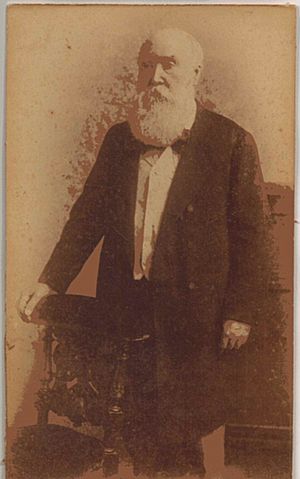John Ivor Murray facts for kids
Quick facts for kids
John Ivor Murray
|
|
|---|---|

Ivor Murray, explorer, collector and medical pioneer in China
|
|
| Born | 1824 Lasswade, Edinburgh
|
| Died | 24 July 1903 London
|
| Nationality | Scottish |
| Occupation | Surgeon |
| Known for | President of British Balneological and Climatological Society |
John Ivor Murray (1824 – 24 July 1903) was a Scottish surgeon and a real adventurer! He worked as a doctor in faraway places like China and during the Crimean War. He was also an explorer, collecting interesting things for museums and joining scientific trips to China. Ivor Murray was known for helping many people and improving health wherever he went.
Contents
A Life of Adventure
Early Life and Education
Ivor Murray was born in 1824 in Lasswade, a town near Edinburgh, Scotland. His father, John Murray, was a lawyer.
Ivor went to school in Paris, France, at the Lycée Saint Louis. After that, he returned to Scotland to study medicine at the University of Edinburgh. He became a qualified surgeon. He even won a special award to become an army surgeon, but there wasn't a job available right away.
Doctor in China
Because there was no army job, Ivor Murray traveled to Canton, China. This was in 1846, and there was a lot of civil unrest. He bravely took charge of a hospital there.
Later, Murray moved to Shanghai, China. He worked with another pioneering doctor, George Rogers Hall. Together, they opened a hospital for sailors in Shanghai in 1852. This hospital had twelve beds for patients. Both Murray and Hall were very adventurous. Hall later collected the first Japanese plants ever sent to New England.
Ivor Murray also sent many interesting items to a museum in Edinburgh. For example, he sent:
- a type of seaweed used as food in Japan
- vegetable wax from Japan, along with the fruit it came from
- seeds of a "vegetable cloth brush"
- nuts of a plant called Quisqualis indica, which the Chinese used for treating worms.
Working in Hong Kong and the Crimean War
In 1852, Ivor Murray moved to Hong Kong. He paid for the first hospital for Europeans there.
When the Crimean War started in 1854, he traveled directly to Sevastopol to work as a surgeon. He helped run the main hospital at Balaklava. After traveling in Egypt, he returned to Scotland in 1856. He earned his M.D. degree from Edinburgh and became a Fellow of the Royal College of Surgeons of Edinburgh. In 1857, he was also made a Fellow of the Royal Society of Edinburgh.
Murray was a very effective surgeon in Hong Kong from 1858 to 1872. During his time, the number of Europeans dying each year in Hong Kong dropped a lot. It went from a very high rate of 7.52% to 2.92%. This was mainly because of better sanitation, but improved surgery and medicine also helped. From 1868, he also checked on hospitals to make sure they were running well.
Later Life and Retirement
Ivor Murray returned to Britain in 1872, planning to retire. However, he had some financial problems and needed to work again. In 1875, he moved to Scarborough, England, a town by the sea. He worked there for fifteen years before finally retiring in 1890.
He was a founder and later president of the British Balneological and Climatological Society. This group promoted the health benefits of bathing and different climates.
Ivor Murray passed away on 24 July 1903 in London.
Family
On 6 February 1861, Ivor Murray married Margaret Agnes Alexander. She was the younger sister of John Alexander, who was a chief clerk at a famous police court.
Ivor and Margaret had nine children. Four of them were born in Hong Kong. At least two of their children also became doctors, following in their father's footsteps.
Ivor Murray was also a keen Freemason, which is part of a social and charitable organization. He became a leader in a local group in Yorkshire, England.
 | Mary Eliza Mahoney |
 | Susie King Taylor |
 | Ida Gray |
 | Eliza Ann Grier |

